The Vancouver Canucks made a lot of changes on their blue line in the offseason bringing in Oliver Ekman-Larsson from the Arizona Coyotes, Tucker Poolman from the Winnipeg Jets, and Luke Schenn from the Tampa Bay Lightning. Of the defencemen that played for the team last season, Quinn Hughes, Tyler Myers, Travis Hamonic, and Olli Juolevi return while Alex Edler has left to join the Los Angeles Kings after 15 seasons with the Canucks.
Related: Canucks Rookie Camp Notebook: DiPietro, Podkolzin, Klimovich & More
As a result, Canucks’ head coach Travis Green will have three new defencemen to break into the lineup. Let’s take a look at how he could line them up against the Edmonton Oilers on Oct. 13.
First Pair: Oliver Ekman-Larsson – Tucker Poolman
With their previous shutdown pairing of Edler and Chris Tanev in Los Angeles and Calgary respectively, the Canucks will have to find a new duo to match up against the opposing team’s top lines. Despite analytics saying otherwise, Ekman-Larsson and Poolman will likely be that pairing come opening night against the Oilers.
General manager Jim Benning has already dubbed Ekman-Larsson as the Canucks’ number-one defenceman and Poolman as Tanev-esque. Clearly, he’s expecting both of them to elevate their games 110 percent and become the team’s next great top pairing. The numbers don’t support that projection, as both were under 50 in Corsi-for percentage (CF%) and they were a combined minus-19 in the plus/minus column.
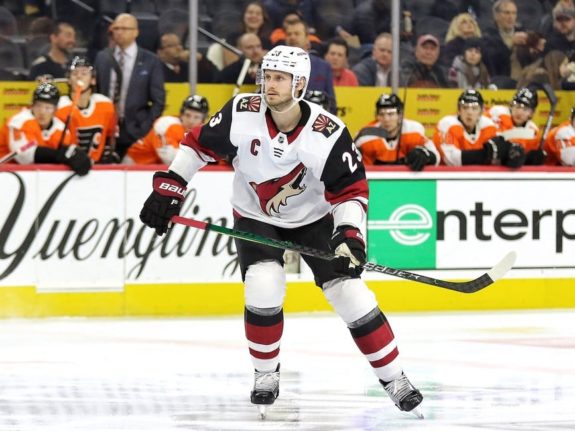
Poolman had a relatively good season paired with Josh Morrissey, but even though he propped his defence partner up defensively, they still finished with a mediocre 46.86 CF% and 108 high danger chances against (HDCA). They ended up finishing the season just behind Derek Forbort and Neal Pionk who surrendered a team-high 142 HDCA.
As for Ekman-Larsson, he has not played like an elite number-one defenceman for a long time. Coyotes’ head coach Rick Tocchet deployed him on the second pairing last season with Ilya Lyubushkin and cut his average ice-time down to 20:58 from 23:01. It was the lowest ice-time he’s seen since his rookie season back in 2010-11. The pairing also finished with a 47.03 CF%. Interestingly enough, Ekman-Larsson played better without Lybushkin by his side upping his CF% to 49.04. We will see how he plays with Poolman, who seems to employ a similar style.
Second Pair: Quinn Hughes – Travis Hamonic
No change here, as Hughes and Hamonic are expected to be joined at the hip once again this season. Hughes likely won’t see as much time against the top lines with Ekman-Larsson taking over those duties, so we might see more even-strength points from him. As a pairing last season they finished with a 48.41 CF% and 103 HDCA while only generating 68 high danger chances. If Green can get them into more favorable matchups throughout the game, maybe they will end up spending less time in their own zone and more time in the attacking end of the ice.
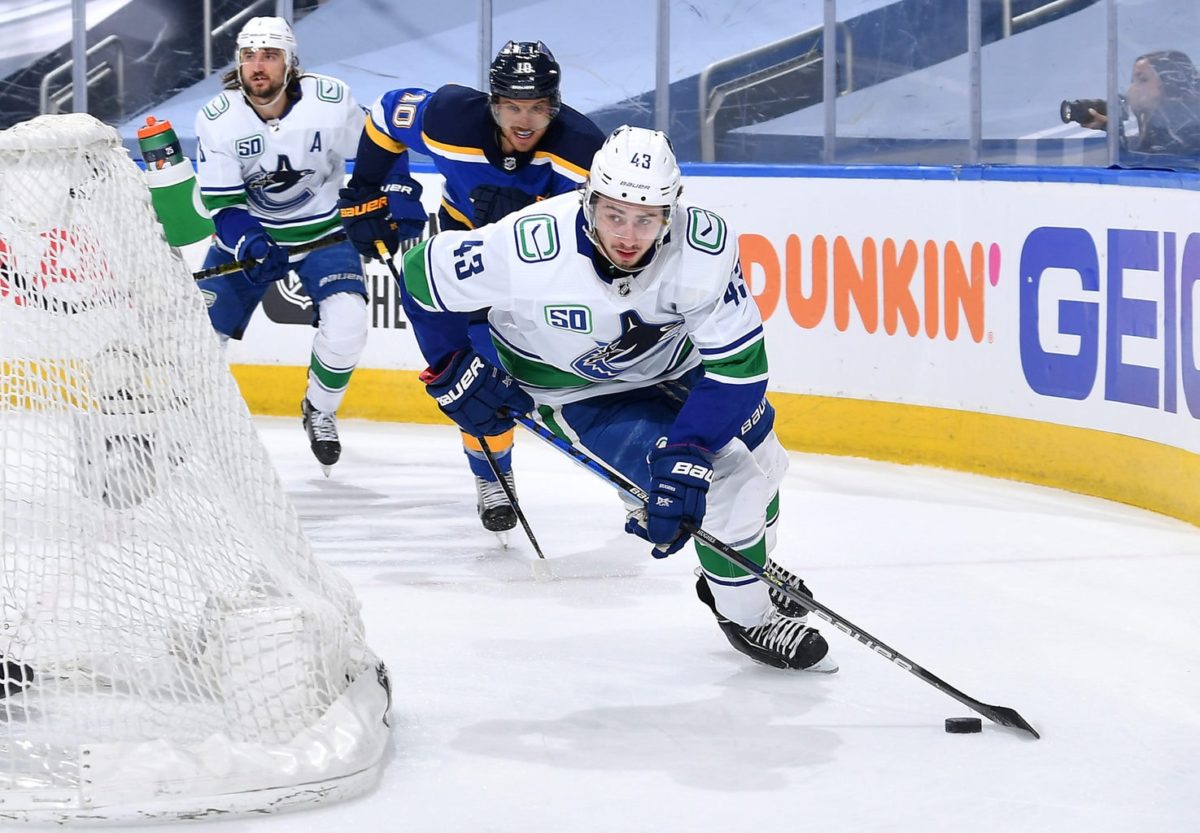
Green should deploy Hughes the same way former head coach Alain Vigneault deployed Christian Ehrhoff back in the 2010s. He was practically glued to the top line of Henrik and Daniel Sedin and Alex Burrows. Hughes and Hamonic should see most of their 5-on-5 ice time with the Lotto Line of Elias Pettersson, J.T. Miller, and Brock Boeser. He’s arguably one of the best offensive defencemen in the NHL, so he should be with three of the best offensive players on the team.
Third Pair: Olli Juolevi – Tyler Myers
This pairing has the potential to be really good, especially if they play together all season. When they were deployed as a duo last season, they recorded a 48.61 CF% and only allowed eight goals against. Myers also played some of his best two-way hockey with Juolevi and we saw fewer defensive blunders from him too. Overall, Juolevi just seemed to calm Myers down.
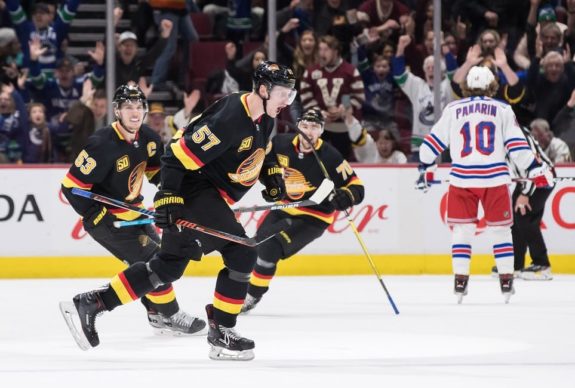
Juolevi saw his best underlying numbers alongside Myers too. In the 73:07 he played without him, he recorded a rather uninspiring 35.43 CF%, while alongside him, it went up to 48.61. If not for his time with Myers, his individual CF% would have been much worse considering he finished the season with a 45.0 CF%. The eye test also favours this pairing as they rarely got into trouble in their own zone when they were together last season.
Seventh Defenceman: Luke Schenn
Schenn was brought in from the Lightning to be the Canucks’ seventh defenceman. He basically will be the Alex Biega of this team for the 2021-22 season. With the injury bug likely to be a factor again this season, he will probably play 50 games. That just seems to be the norm for seventh defencemen around Vancouver these days. He played a similar role with the Lightning as he provided solid two-way defence and penalty killing en route to his second-straight Stanley Cup.
Schenn will bring a veteran presence to the locker room and previous chemistry with a certain young defenceman by the name of Quinn Hughes. When Schenn was brought in by Benning at the trade deadline from the Anaheim Ducks, he played almost exclusively with the 21-year-old and ended up being a calming presence for him.
He calmed me down…I wasn’t, I honestly wasn’t nervous at all in that first game; and those five games, I wasn’t nervous. I think because, you know, he was always talking to me, he’s really communicative and he was good, like we didn’t spend a lot of time in the D zone. He helped me out a lot.
Quinn Hughes on Luke Schenn (from ‘Patrick Johnston: Quinn Hughes’ nervy start was calmed by cool hand Luke (Schenn)’ The Province, 1/7/20)
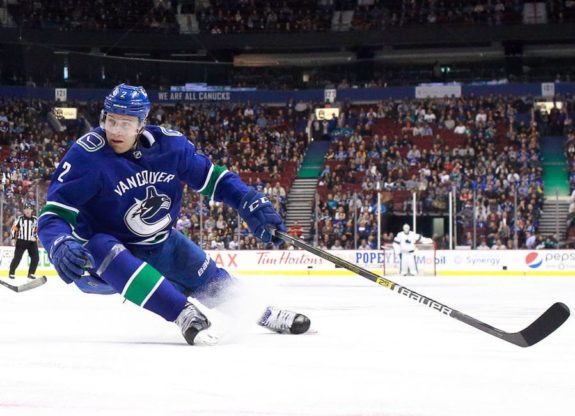
If Schenn plays well during training camp and the preseason, I wouldn’t be surprised to see Green start the season with a second pairing of Hughes and Schenn. He will have to beat out the likes of Hamonic and Poolman, but with his veteran smarts and familiarity with the team, he might just end up replacing one of them on the opening night roster.
Battles in Training Camp
The first five defencemen on the Canucks depth chart seem to be set going into the 2021-22 season. The question marks begin at the sixth, seventh and eighth spots. Juolevi is poised to take one of them based solely on the fact that he does not have to clear waivers. If another young defenceman like Jack Rathbone outperforms him in training camp, Juolevi will still begin the season on the roster.
You may also like:
- 3 Contracts the Canucks Need To Move
- Canucks’ 10-Game Losing Streak: By the Numbers
- Mark Messier – NHL Legend and 6-Time Stanley Cup Winner
- NHL Morning Recap – January 18, 2026
- Insider Reports Rangers Made Solid Offer for Canucks’ Kiefer Sherwood
Similar to Troy Stecher at the beginning of the 2016-17 season, Rathbone, despite his performance in the preseason, will be sent to the minors. We all know what happened after that, Stecher only played four games before he was back with the big club. He ended up playing 71 games all while recording a career-high 24 points and averaging 19:59 of ice time. I see that same sort of thing happening with Rathbone.
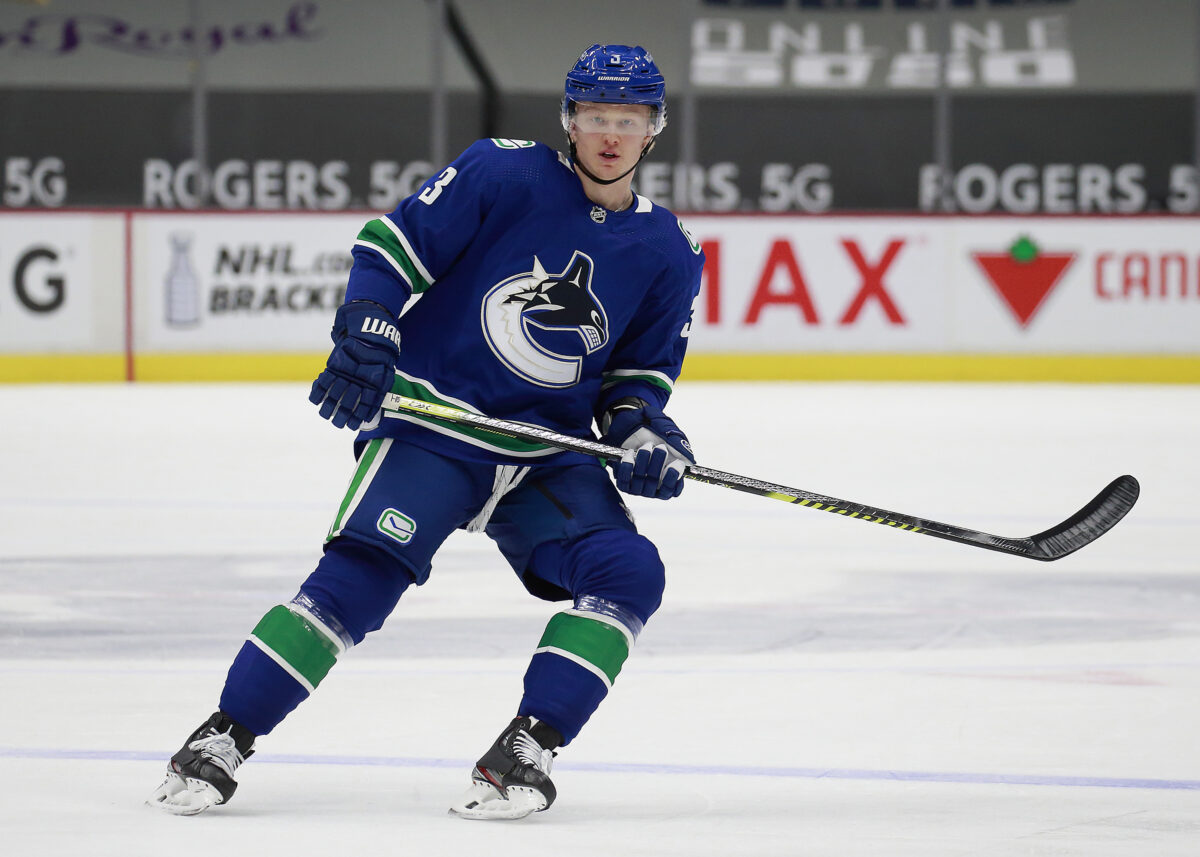
Finally, don’t sleep on Maple Ridge native Brad Hunt. The veteran of 191 NHL games has not seen the inside of an American Hockey League (AHL) dressing room since the 2016-17 season and I’m sure he doesn’t want to return any time soon. He is undersized at 5-foot-9, but as we all know, size doesn’t always dictate NHL success. Like the aforementioned Biega, he has carved out a niche as the perfect sixth or seventh defenceman. He plays an efficient two-way game whenever he’s called upon and never complains about his role. Unlike Biega though, he has proven to be a bit of a power play specialist with 11 of his 19 career goals scored with the extra man.
Similar to the fourth-line battle with Zach MacEwen, William Lockwood, Jonah Gadjovich, and Phil Di Giuseppe, this bout will also be an interesting one to watch throughout training camp. The Hockey Writers will be there to bring you all the action from Abbotsford Centre starting on Sept 23 and into the preseason against the Seattle Kraken on Sept 26.
All stats were taken from Hockey Reference and Natural Stat Trick
